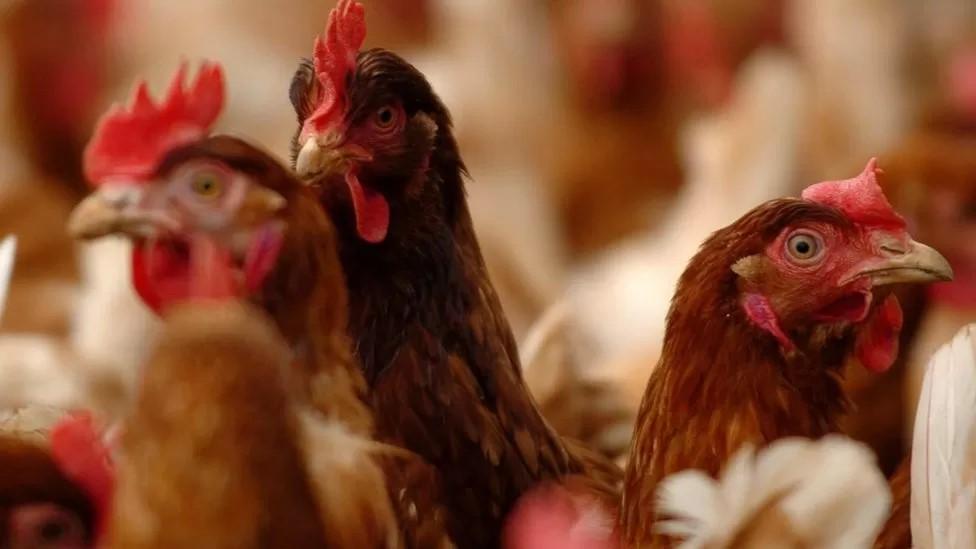Bird flu: Farmer wants Welsh government housing order
- Published
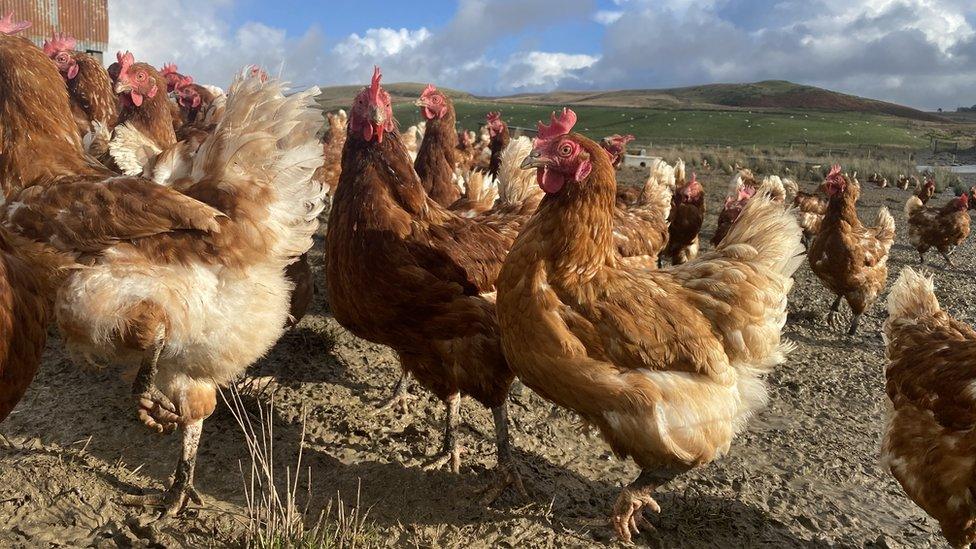
Capestone Organic Poultry Ltd lost 130,000 chickens in an avian flu outbreak in September
The Welsh government lacks "understanding and awareness" of avian flu, a large poultry business has said.
This September, 130,000 organic chickens were culled, following a "very small outbreak" of bird flu in one of its sheds.
The Welsh government has said the situation is "under daily review".
The managing director of Capestone Organic Poultry, near Milford Haven, Pembrokeshire, is calling for a mandatory housing order.
This measure - currently in place in England - legally requires all bird owners to keep their animals indoors and to follow stringent measures to protect their flocks from the disease.
Avian influenza is a highly contagious viral disease which affects the respiratory, digestive or nervous system of many species of bird.
Some strains can spread easily and quickly between birds and have a high death rate.
On Tuesday, Minister for Rural Affairs Leslie Griffiths issued a statement on the severity and spread of avian influenza in Wales, emphasising it was "under daily review".
She also confirmed she still stood by the decision made by the chief veterinary officer for Wales, who declared an all-Wales Avian Influenza Prevention Zone (AIPZ) on 17 October 2022.
The AIPZ requires all bird keepers to adhere to certain biosecurity measures.
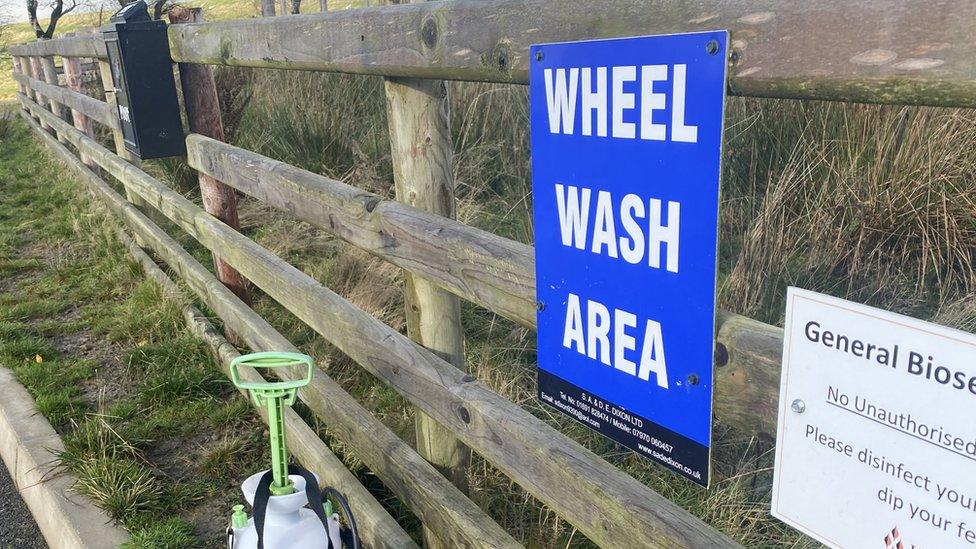
Stringent biosecurity measures are in place to try and prevent spread of the disease.
In a statement at the Senedd on Tuesday, she said: "Over the last 12 months, we have witnessed the most severe outbreak of avian influenza in Wales and across Great Britain.
"This has been the largest outbreak of an exotic notifiable disease in animals since the catastrophic outbreak of foot and mouth disease in 2001."
Ms Griffiths said the Welsh government was taking a "science-led approach", rather than following the UK government in England, which, on Monday, 7 November brought mandatory housing of birds into force.
"Fortunately, in Wales, we have not seen anything like the number of outbreaks in England, which would be required to justify any such housing order," she said.
"Furthermore, the scientific advice of my interim chief veterinary officer is that, for Wales, the biosecurity requirements of our AIPZ are currently appropriate and sufficient to contain the threat."
In total, Wales has recorded 10 infected premises since October 2021. There were none between February and September 2022.
There have been three infected premises confirmed in Wales since the beginning of October 2022
The latest confirmed case was at a premises near Buckley, Flintshire, on Monday 7 November.
'Critical time'
Having experienced first-hand the effect of avian flu on his business, Capestone managing director Rob Cumine said he believed the Welsh government needed to have a "serious rethink" about how it manages the disease.
"We're in quite a critical time in terms of controlling the disease and housing orders are very effective, both within domestic poultry and also in wild birds," he said.
"I think we should be aligned [with England]. Just because there's a border, a wild bird doesn't respect that necessarily as it flies between farms."
The business supplies major high street retailers and well-known brands, employing roughly 200 people year-round in rural Pembrokeshire.

Rob Cumine, of Capestone Organic Poultry farm, is calling for further government action
Reacting to the Welsh government's AIPZ as a means of managing the disease, Mr Cumine said he did not think it was sufficient.
"There's lots of things going on in the world at the moment and avian influenza is one of the challenges that government face but, for an individual business, when it impacts you, it is disastrous really," he said.
"I think there's been a lack of government understanding and awareness. We've seen some announcements in England, a shift in support and understanding of the impact, so I'm hoping we'll see more in Wales."
But for Ioan Humphreys, from Carno, Powys, who has 32,000 hens, the financial costs of keeping them indoors would also cause concern.
"The flock do enjoy being outside a lot," he said.
"It would have a big effect on them, it would stress them out, it would increase my feed prices. I'd have to buy more equipment in the shed to keep the birds happy, more pecking blocks to stop them getting too stressed, so it would have a financial strain on the business."
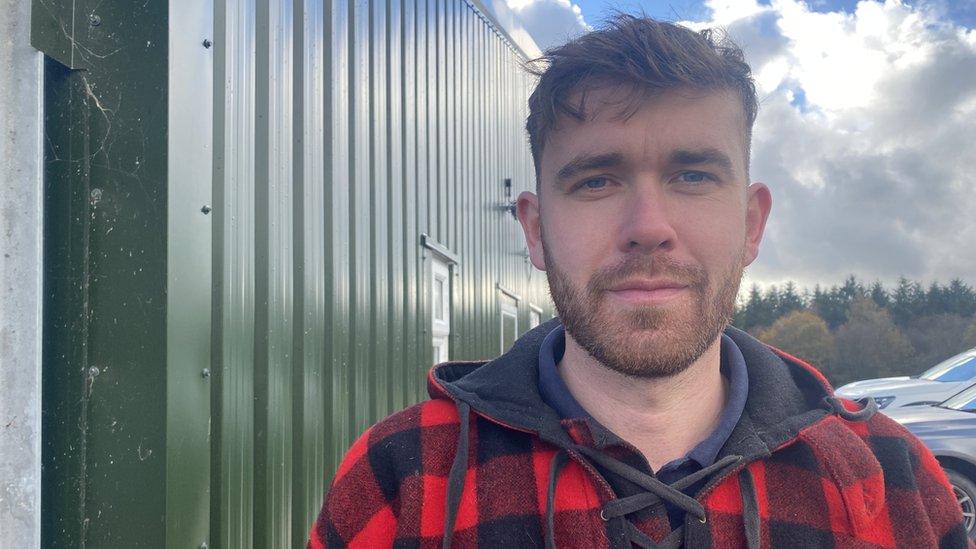
Ioan Humphreys, of That Welsh Farmer, says a housing order would increase financial pressures on him
Farming unions are also calling on the Welsh government to keep a close eye on the development of the disease.
NFU Cymru representative and poultry farmer Llŷr Jones, from near Corwen, Denbighshire, has expressed his daily fear of the avian flu.
"We've got nearly as many cases as the whole of last year, and we're only a few days into the winter," he said.
"Why did we have a housing order last year, and why aren't we having one this year even though we've got more cases?"
Mr Jones's hens are spread out over 40 acres (16 hectares) of land.
He said: "I don't know how many birds fly over this land each day, but it would be quite a high number. By having them outside, for me, it's not if I get avian flu, but when.
"That's why it's important to have this housing law for the hens, so that I can then make sure no wild birds are able to get into my flock."
He added: "I'm not sure how England's science is telling people to house them [the hens] and the Welsh science isn't.
"It just doesn't make any sense and I just hope they will change their minds very soon."
A Welsh government spokesperson said: "Having analysed the available scientific evidence, we are not introducing mandatory housing of poultry in Wales at this time.
"We will continue to monitor the situation in Wales. All keepers must keep their birds safe by rigorously applying the biosecurity measures in the Wales Avian Influenza Prevention Zone, and be vigilant for signs of the disease."
If you have suspicion or confirmation of Avian influenza, contact your local Animal and Plant Health Agency (APHA) office immediately on 0300 303 8268.
- Published8 November 2022
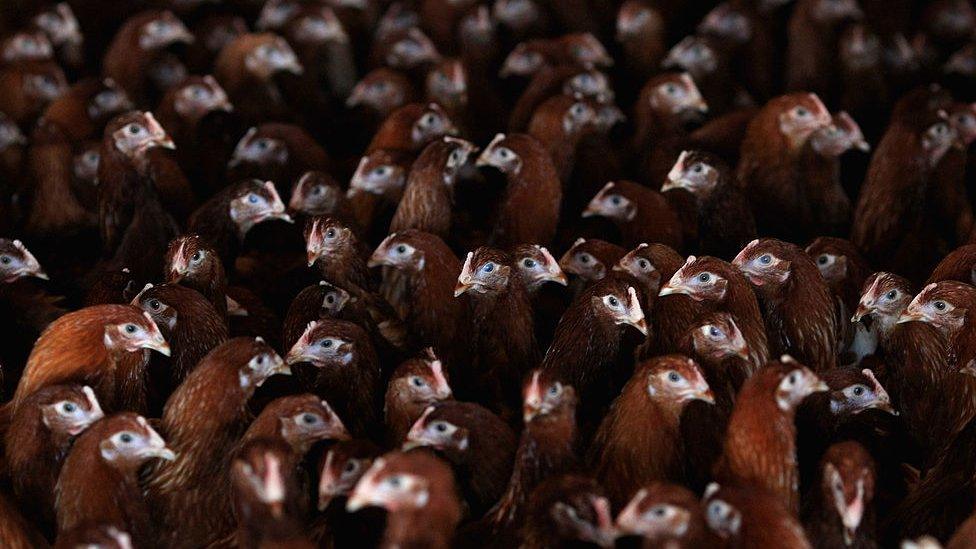
- Published3 October 2022
